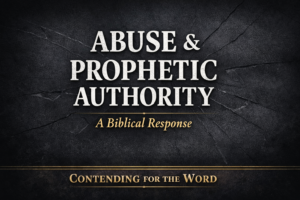⏱️ Estimated Reading Time: 11 min read
God created the Church to help people flourish in community with one another. He didn’t give you or only a few individuals every single spiritual gift. Rather, the Holy Spirit dispersed them among God’s people. You and I are not an island unto ourselves. We are fallible and easily blinded by our sin which even means sometimes we deceive ourselves into thinking we are good when we aren’t. The Body of Christ is essential to your sanctification, which is why the Lord desires to use you to help others in their growth in grace.
As we begin this article, we need to ask ourselves the question, “How can we be a part of the sanctifying work God is doing in our friends?” The Bible presents at least four ways: First, calling out one another’s sin, second, encouragement to do good works, third, accountability, and finally supporting one another in difficult times.
Pointing Out Sin
When we talk about pointing out one another’s sin, we may understand that this is difficult but often do not understand how to do this biblically with the goal of helping the other person grow in Christ. I’ve heard stories and even witnessed incidents online where people attempted to point out sin in someone else’s life. Instead of it being helpful to the other person, the person confronting made a headfirst dive into sin themselves with unkind words, nasty criticism, and anger.
It’s important to consider as we talk about calling out one another’s sin that doing so is necessary for the health of our brothers and sisters in Christ. Paul told the Corinthians that they must remove the immoral man who was among them. Otherwise, he would corrupt the entire church (1 Cor. 5:6-8).
Though it can be easy to sin when trying to call out sin in others, this does not mean we should avoid doing so altogether. It is important that we point out sin in our Christian friends but do so in a godly way. To confront others effectively and in love, we must take our own growth in grace as seriously as we expect others to do so. Doing this means instead of pointing the finger at others, we will first point the finger at ourselves, so we can address the issues in our lives. This will help us to see others through the eyes of Jesus. This approach will help us to offer clear, biblical advice in a compassionate speak the truth in love way. Furthermore, it will also help us to not be impatient, or quick to anger, but instead, quick to listen and slow to speak. The end result is we will be gentle and the other person will be genuinely pointed to Jesus.
Secondly, we must put on an attitude of love and gentleness (Galatians 6:1). We are not aiming to be prideful or attack their character. Instead, we are seeking to humbly recognizing it could be us caught in the same sin. Your desire should be to restore this person to a right relationship with God and others, not to harm them.
My husband does this well in our marriage. When we argue, I am not the best at remaining calm. At times, my first instinct is to become angry. Instead of yelling back at me or telling me I’m a bad wife, he keeps his composure and gently reminds me that my anger isn’t righteous and isn’t helpful to the present situation. His goal is never to appear better or to shame me, but to remind me to be obedient to Christ.
Christians are called to restore our brothers and sisters when they are caught in sin (Galatians 6:1). This means that we do more than just point their sin. The Greek word for restore can also be translated as mending, which is how it is used in Matthew 4:21. When you mend something, do you only point out what’s wrong with it and walk away? No, we take our time and work to fix what has been broken. In the same way, we stop and help those who are caught in sin, whether it’s through providing accountability, giving them biblical guidance, or setting them up with someone who can assist them.
Encouragement to Do Good Deeds
Hebrews 10:24-25 says, “And let us consider how to stir up one another to love and good works, not neglecting to meet together, as is the habit of some, but encouraging one another, and all the more as you see the Day drawing near” (ESV).
We should encourage our friends in the use of their gifts. One way to do this is to encourage your friend who works well with children to try teaching one of the younger Sunday School classes. Not only is it uplifting to have someone share how you are gifted, but it will also benefit the entire church when we are using our gifting in an edifying manner.
To do this well requires getting to know our brothers and sisters in Christ. While it is easier to stay on the surface level in our relationships and never move beyond that, it is much more edifying when we are actually involved in people’s lives and seek to know them truly. It is easier to encourage someone to do good works when we actually know what gifts they possess.
During a conversation with my husband, our pastor asked him what our spiritual gifts were. He told my pastor that I was gifted in teaching. Following that discussion, our pastor asked me if I would be willing to be a children’s Sunday School teacher. Secretly I had wanted to volunteer to help in Sunday School for a while, but never found the courage to ask, since I figured all the positions were filled and they wouldn’t want somebody younger on the team. Since joining the Sunday School team, I’ve loved being able to teach the young children in our church. I am so thankful that our pastor encouraged me to take up this role in my local church.
Accountability
Accountability can sometimes be awkward and embarrassing, at least in the beginning. I have been on both sides of accountability, and it can at times be difficult. With that said, if we are going to fulfill the command in Galatians 6:1 to restore those caught in sin and Hebrews 10:23 to encourage one another to do good deeds, we need accountability.
Accountability does not need to be complicated, but it should be intentional and in a spirit of love. Burk Parsons is right that accountability is first and foremost an arm around the shoulder not a finger in the face. This explains why patience and grace are essential for accountability. We must remember the grace and patience God has shown us. Also, remembering how the Lord won you over when you were stuck in a particular sin; He did not yell and scream, He did not shame you, He showed you mercy.
Support in Difficult Times
Periods of suffering have made me so thankful for my dear friends who have stuck by my side during these difficult times. These friends are the ones who continue to help me keep my eyes on Christ. The Lord has used these friends to keep me focused on Him even in the darkest and worst of moments.
During my first year of university, my anxiety and depression from my past began to come back, which lead to me struggling with doubts about my salvation and if God actually forgave me. During this time of my life, I didn’t see Him as a gracious Father, but as a God who was continually angry with me and punishing me with depression and anxiety. I am thankful for my friend Jane, who always pointed me back to Scripture and the preaching of God’s Word to remind me of the truth of who I am now in Christ. She spent time studying 1 John with me and reminded me of the evidences of salvation. Through studying the Bible with her, I became convinced of my hope of salvation and could rest in the atoning work of my Lord and Saviour Jesus Christ.
No matter how scary or distressing a situation your friends are going through, you can still be there for them. Sometimes, it simply means sitting next to them, praying with them, or providing a meal. Even if you can’t understand what they are going through, you can still love and support them by reminding them of truths in the Word of God. God’s Word. Our ultimate goal should be not that they glean some amazing truth from you or are changed by some perfect advice you gave, but that they rest in the sufficient God who can provide for their every need perfectly.
Practical Ways to Grow Together in Your Sanctification
- Start a Bible study together. This does not mean meeting together once a week to discuss what you learned and then never communicate again during the week. Though that does have benefits, you probably won’t be able to do much of what I listed above. Instead, have an intentional study group where you pray for one another, ask questions and take an interest in one another’s lives, discuss life together, encourage one another during the week, and provide accountability for one another.
- Be willing to bring God into your everyday conversations. Whether it was my fault or the other people, I have been in situations amongst fellow Christians where I did not feel comfortable talking about spiritual topics. Please don’t allow your relationships to come to this point. Whether it’s awkward or not, bring up these issues and discuss what you are learning in the Word, in Sundays school, and at church. Please, don’t let your conversations remain solely focused on surface level things.
- Be willing to be vulnerable, even if you have to be the first one to do so. People love to talk about vulnerability, but no one wants to be that first person to open up. However, simply hoping you someday go on a deeper level with your friends isn’t going to make it happen. Some has to start, and that may have to be you. It’s tough, and it’s sometimes messy, but it can have beautiful results.
A final story, to show you how this has worked out in my life. As I said earlier, I struggled with anxiety and depression in my first year of university. Near the end of my last semester, I was fed up with school, and all I wanted was to go home. During that time, I distanced myself from my friends; I spent the majority of my time in my room “doing homework,” and snuck around campus to meet with the university counselor.
I only found rest when I broke down in front of my friends and told them what was going on. They didn’t poke fun at my homesickness, nor did they drop me as a friend; instead, they came around me and strived to make the last bit of my semester a joyful time. They checked in on me, and they prayed for me. Despite the immediate shame and embarrassment I felt, the relief vulnerability brought me made it worth it.
Wherever you are at in your life today and whatever is going on in this season of life, I encourage you to be intentional in your friendships. Seek to grow in the grace of God yourself. Pray for and ask the Lord to provide opportunities for you to minister to others. Pray also that He will surround you with godly friends who will point you to the truth of God’s Word and the precious treasure of the gospel. Along the way, you’ll find that you are growing in grace and the Lord is using you in surprising ways to make known His glory among the nations.



